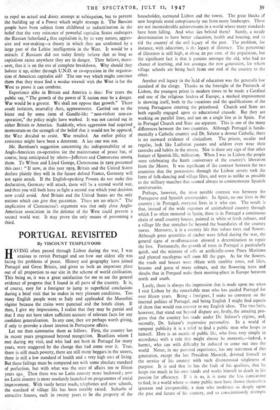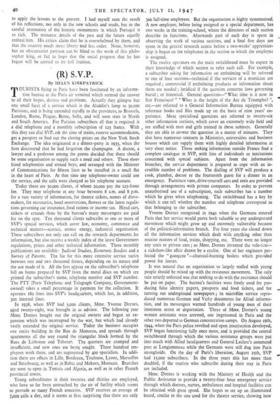PORTUGAL REVISITED
By VISCOUNT TEMPLEWOOD
HAVING often passed through Lisbon during the war, I was anxious to revisit Portugal and see how our oldest ally was facing the problems of peace. History and geography have joined Portugal and Great Britain, and given us both an important place out of all proportion to our size in the scheme of world civilisation. This being so, it was a great satisfaction for me to see the general evidence of progress that I found in all parts of the country. It is, of course, easy for a foreigner to jump to superficial conclusions during a brief visit that he makes in very pleasant conditions. Too many English people went to Italy and applauded the Mussolini regime because the trains were punctual and the hotels clean. If then, I give my impressions, I realise that they may be partial and that I may not have taken sufficient account of relevant facts for any confident generalisation. In any case, they are perhaps worth giving, if only to provoke a closer interest in Portuguese affairs.
Let me then summarise them as follows. First, the country has in recent years progressed beyond recognition. Brazilians whom I met during my visit, and who had not been in Portugal for many years, were staggered by the change that had come over it. True, there is still much poverty, there are still many beggars in the streets, there is still a low standard of health and a very high cost of living. But these failings must be compared not with some absolute standard of perfection, but with what was the state of affairs ten or fifteen years ago. Then there was no Latin country more backward ; now no Latin country is more resolutely launched on programmes of social improvement. With vastly better roads, telephones and new schools, the standard of village life has been notably raised. Suburbs of attractive houses, each in twenty years to be the property of the
householder, surround Lisbon and the towns. The great blocks of new hospitals stand conspicuously out from many landscapes. These are not inconsiderable achievements in a world where many standards have been falling. And what lies behind them? Surely, a steady determination to have better education, health and housing, and to rid the country' of the evil legacy of the past. The problem, for instance, with education, is the legacy of illiteracy. The percentage of illiterates is still high, at about zo per cent. of the population, but the significant fact is that it persists amongst the old, who had no chance of learning, and not amongst the new generation, for whom village schools are being built from one end of the country to the other.
Another evil legacy in the field of education was the generally low standard of the clergy. Thanks to the foresight of the Patriarch of Lisbon, the youngest priest in modern times to be made a Cardinal and one of the religious leaders of Europe, a marked improvement is showing itself, both in the vocations and the qualifications of the young Portuguese entering the priesthood. Church and State are both equally engaged upon an educational crusade. But they are working on parallel lines, and not on a single line as in Spain. For in Portugal Church and State are separate. This is one of the many differences between the two countries. Although Portugal is funda- mentally a Catholic country and Dr. Salazar a devout Catholic, there is no outward evidence of clericalism. The priests, secular and regular, look like Lutheran pastors and seldom even wear their cassocks an habits in the streets. Nor is there any sign of that other feature of Spanish life, militarism. When I was in Lisbon the people were celebrating the &path anniversary of the country's liberation from the Moors. It was significant of the contrast between the two countries that the processions through the Lisbon streets took the form of folk-dancing and village fetes, and were as unlike as possible to the military marches that seemed always to commemorate Spanish anniversaries.
. Perhaps, however, the most notable contrast was between the Portuguese and Spanish countrysides. In Spain, no one lives in the country ; in Portugal, everyone lives in it who can. The result is that, instead of the wide expanses of uninhabited country through which I so often motored in Spain, there is in Portugal a continuous chain of small country houses, painted in white or fresh colours, and a village life that stretches far beyond the boundaries of the country towns. Moreover, it is a country life that values trees and flowers. Although great quantities of timber were felled during the war, the general signs of re-afforestation showed a determination to repair the loss. Fortunately, the growth of trees in Portugal is particularly quick, and the, mixture of self-- or artificially-sown Pinex Maritima and planted eucalyptus will soon fill the gaps. As for the flowers, the roads and houses were ablaze with rambler roses, red lilies, brooms and gorse of many colours, and the flowering trees and shrubs that in Portgual make their meeting-place in Europe between north and south.
Lastly, there is always the impression that is made upon me when I visit Lisbon by the remarkable man who has guided Portugal for over fifteen years. Being a foreigner, I make no comment on the internal politics of Portugal, and being English I might find aspects of them that would run counter to my English ideas. The two facts, however, that stand out beyond dispute are, firstly, the amazing pro- gress that the country has made under Dr. Salazar's regime, and, secondly, Dr. Salazar's impressive personality. In a world of rampant publicity it is a relief to find a public man who keeps to himself. Here is an ascetic of public life, who lives very simply in accordance with a rule that might almost be monastic,—indeed, a hermit, who can with difficulty be induced to come out into the world. Never, in my personal experience, has any statesman of this generation, except the late President Masaryk, devoted himself to the service of his country with such disinterested singleness of purpose. It is said that he has the fault of his qualities, that he keeps too much in his own hands and works himself to death in his passion for efficiency. If it is- so, it is none the less comforting to find, in a world where so many public men have shown themselves ignorant and irresponsible, a man who meditates so deeply upon the past and future of his country, and so conscientiously attempts to apply the lessons to the present. I had myself seen the result of his reflections, not only in the new schools and roads, but in the careful restoration of the historic monuments in which Portugal is so rich. The minutest details of the past and the future equally enthral him. His critics claim that he is overwhelmed by them, and that the country needs more liberty tend less order. None, however, but an obscurantist partisan can be blind to the work of this philo- sopher king, or fail to hope that the social progress that he has begun will be carried to its full fruition.



































 Previous page
Previous page